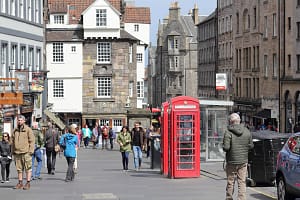Nine out of ten shoppers say free delivery is their number one incentive to spend more, reveals new research conducted by the e-commerce delivery expert ParcelHero. Orders with free shipping are also 30% higher on average than those with delivery costs. Amid concerns that the Government’s proposed new compulsory delivery charge will remove this key spending incentive, ParcelHero fears that this will significantly reduce retail sales.
David Jinks MILT, Head of Consumer Services at ParcelHero, says its latest research reveals shoppers strongly value free shipping. A compulsory, plastic bag-style charge would significantly discourage spending online.
What the UK economy needs now is an increase in consumer spending. People are holding on tight to their savings because they are rightly concerned about job security. Added to that is anxiety about visiting crowded stores. Astonishingly, this is the moment the Government has chosen to propose an entirely new tax on online deliveries. Retail analysts believe the compulsory delivery charge, proposed in June’s “Position Paper on Last Mile Logistics”, is likely to be a minimum of £2 an order or an additional 2% on the overall spend. Removing free deliveries is a big psychological step that could have a significant impact on consumer behaviour.
‘The Government says the new charge could be applied on all consumer deliveries and returns in order to “encourage consumers to realise their true business, societal and environmental cost, and hence encourage more sustainable behaviour.” With consumer confidence so exceptionally fragile, this move could prove disastrous. Free shipping is a significant trigger for online consumer spending and one of the few incentives encouraging shoppers to spend money. ParcelHero’s latest research reveals 57% of British shoppers say free shipping is key to their choice of retailer.
‘In all, 58% of shoppers spend more online to qualify for free shopping, where it applies above a certain level, and research from web consultants Invesp shows 16% purchase a more expensive brand in order to qualify for free shipping. It’s believed that 78% of Amazon Prime members give free shipping as their main reason for joining.
‘There are two reasons why it is, frankly, nonsense to claim that the delivery tax is being imposed for environmental reasons. Firstly, 50% of us actually choose the slowest – hence most environmentally friendly – delivery option if it is the only free one. Many would rather have a three or four-day delivery than a resource-consuming, next-day service if it means avoiding extra costs. Secondly, as we have continually repeated, home deliveries are far greener than shopping trips by car. The highly regarded 2009 academic report “Carbon Auditing the Last Mile” found that a dedicated car trip for a specific item produced as much as 4,274 grammes of CO2 per km. In contrast, a successful, first-time home delivery creates just 181 grammes of CO2 per km per parcel. Ending free deliveries would result in shoppers climbing back into their cars to shop in town.
Recent newspaper reports suggest the Government has begun to admit internet taxes are unfairly falling on consumers. It is allegedly considering scrapping its new Digital Services Tax on UK purchases made on international sites such as Amazon, which was only introduced in April.
It’s unpopular with the US Government and this week’s Mail on Sunday story revealing the Chancellor’s change of heart acknowledged, “internet giants will pass its costs on to customers. Earlier this month, Amazon announced it would increase seller fees from September after talks with the Government on the DST failed to progress.”
Equally damaging will be the proposed delivery charge and a separate 2% internet tax also being considered to replace lost business rates revenues. The UK’s online shoppers are in danger of being taxed ‘til the pips squeak. It is simply unfair to the huge number of elderly or shielding people who have turned to online shopping for the first time during the pandemic. It’s also important to remember that, in reality, few deliveries are actually “free”. Most online retailers have simply built the cost of delivery into the price of their items.
The new charge could hit just as Tesco is creating 16,000 new e-commerce jobs and Amazon is investing heavily to ensure that millions more shoppers can enjoy free food delivery. In July, Amazon announced it would scrap its minimum delivery charge on Amazon Fresh orders and expand Amazon Fresh to millions of Prime members across the UK before the end of the year.
In August, Tesco announced it will also offer free delivery to its Clubcard Plus members. It promised yesterday to create 16,000 new jobs to support its online business. The new posts will include 10,000 staff to pick customer orders from shelves and 3,000 delivery drivers.
These initiatives will give increased job security and create welcome savings for Britain’s hard-pressed consumers. It would be a real shame if the Government’s desperate desire to find new revenue sources actually ends up halting this growth of online sales, one of the few areas of the economy still showing sustained growth and one that will prove essential if a second wave of Covid-19 hits the UK.






Leave a Comment